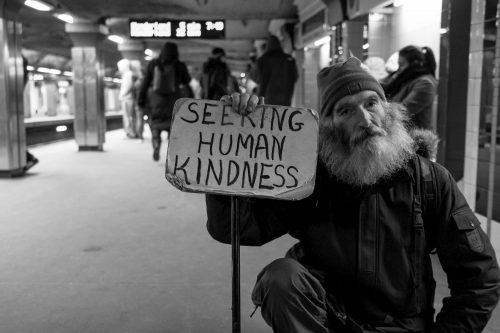In this sermon, we answer a few questions about love mainly this one: Does love mean putting up with mistreatment from family, neighbors, and enemies?
Last time we talked about five kinds of love and the one that matters most. The world only knows of four, but not the fifth which is why someone who says they love you can harm you (deliberately or not) without sympathy. Why is this? Because they lack agape—God’s love—the fifth kind of love. The world can seem so cold because it’s void of God’s love.
The five loves:
- Agapao: Affection for a person, place, or thing.
- Storge: Affection, connection for blood relatives and spouse.
- Phileo: A deeper connection and affection for friends or family member.
- Eros: Sexual attraction, affection, intimacy for opposite sex.
- Agape: Godly treatment of people according to God’s standards.
Today we’ll explore love again, this time answering a few questions:
- Should we love everyone?
- How should we love people?
- Does love mean putting up with mistreatment from people?
- Should are love for people be without conditions?
Should we love everyone?
The answer is Yes. We are commanded to love everyone including our enemies. See 1 Samuel 24:17, Proverbs 19:11, Proverbs 25:21, 1 Thessalonians 5:15, Leviticus 19:18 and the main commandment here:
43 “You have heard the law that says, ‘Love your neighbor’ and hate your enemy. 44 But I say, love your enemies! Pray for those who persecute you! 45 In that way, you will be acting as true children of your Father in heaven. For he gives his sunlight to both the evil and the good, and he sends rain on the just and the unjust alike. 46 If you love only those who love you, what reward is there for that? Even corrupt tax collectors do that much. 47 If you are kind only to your friends, how are you different from anyone else? Even pagans do that. 48 But you are to be perfect, even as your Father in heaven is perfect (Matthew 5:43-48 NLT).
How should we love people?
We should show agape love, but this doesn’t mean we will have a fondness for everyone especially our enemies. How can you like people who mistreat you? You can’t. Those emotional responses don’t come up because our bodies are designed to protect themselves.
The enemy has deceived some into believing they don’t have godly love if they don’t feel fondness for someone who mistreats them. It would be inauthentic to say I’m fond of a racist, abuser, narcissist, etc.
The correct response as commanded is to show agape love for that person but hate the sin; and in regards to unrepentant enemies we can pray for justice (Luke 18:1-8).
At least 15 attributes are present in agape:
- patience
- kindness
- isn’t envious
- isn’t boastful
- isn’t proud
- isn’t rude
- isn’t selfish
- isn’t easily provoked
- doesn’t contemplate evil
- doesn’t rejoice in sin
- rejoices in the truth (honest)
- bears all things (doesn’t gossip)
- believes all things (trusting)
- hopes for the best
- endurance (loyalty)
Does love mean putting up with mistreatment from people?
Narcissistic family members, racist coworkers and neighbors, abusive churches, drama-filled spouses: do we have to endure such treatment for love’s sake?
The answer is No.
- Jesus didn’t let his enemies push him off a cliff (Luke 4:29-30).
- Jesus said, “when they persecute you in one city, flee to the other” (Matthew 10:23).
- Scriptures commands: If it’s possible, live at peace with everyone, don’t avenge yourself, let God get revenge (Romans 12:17-19).
Some saints leave family and friends for Christ’s sake (Matthew 19:29)
- Don’t eat with immoral believers (1 Corinthians 5:11)
- Be not unequally yoked (2 Corinthians 6:14)
- God has called marriages to be at peace (1 Corinthians 7:15).
But Jesus said “turn the other cheek”
Yes. Jesus said if someone slaps you on your right cheek, turn the other cheek (Matthew 5:39). Firstly, Jesus seldom makes statements that are extreme, but not to be taken literally. Examples: Jesus said, “pluck your eye out and sever your hand” (Matthew 5:29-30).
What Jesus meant by “turn the other cheek” was: Don’t get revenge as the law stated (an eye for an eye. See Exodus 21:24). To onlookers, refraining from legal retaliation would be as if you turned the other cheek.
Review
- Should our love for people be without conditions? Yes. Agape love is godly treatment in spite of someone else’s behavior—it’s our character—it’s who we are.
- Do you have to feel fondness for people who don’t love you? No.
- Do you have to keep ungodly people in your circle or stay connected? No. Disfellowship is not a lack of love, it’s obedience to God and love for the peace of God.
Now may the Lord of peace himself give you his peace at all times and in every situation. The Lord be with you all (2 Thessalonians 3:16)



